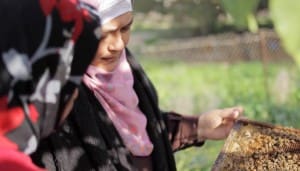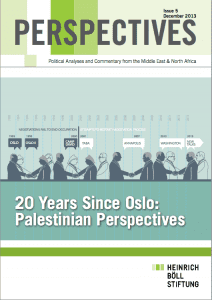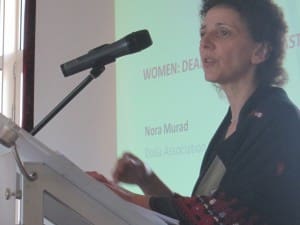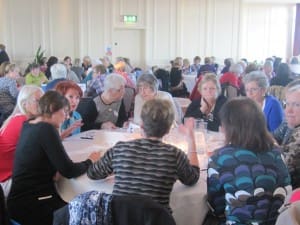This article was published in This Week in Palestine.
While the legally enshrined human right to self-determination has long been recognised as central to the Palestinian struggle, the human right to development – declared in a UN General Assembly resolution in 1986 and reaffirmed many times since – has not received the attention it deserves. Taken together, these two human rights suggest that Palestinians have a right to determine their own development agenda and to control the resources needed to implement it.

The formulation is new, but the essence of the “right to self-determination in development” is already incorporated into much of the global discourse on improving international development. Yet when development and aid actors talk about local ownership, results, transparency, and mutual accountability, they talk about them in terms of industry standards. Without invoking legal rights and obligations, these standards are impotent.
Many Palestinians, like other aid-receiving peoples, voice complaints about international aid policies and practices, yet few frame the problems in terms of violations of human rights. And since there is no repository for these complaints and no mechanism to investigate issues or develop collective awareness of them, complainants have no recourse except to submit grievances to each individual agency. There is no mechanism for individual or collective accountability.
If a mechanism existed whereby Palestinians could constructively raise their voices about violations of their rights in the context of international aid, and if information about persistent or egregious violations was made public, then Palestinian civil society would be empowered to pressure international aid actors for change. Alternatively, they could refuse certain kinds of aid. The very process of proactively making informed, collective decisions would challenge power imbalances with international actors and advance Palestinian efforts to claim their right to self-determination in development. This is the experience of Dalia Association, which has advocated reform of international aid over several years.
An independent Palestinian “community court” on international aid could constitute that mechanism. The community court could receive, investigate, and rule on a wide range of complaints that involve aid to Palestinians, bringing problems related to international aid under Palestinian scrutiny using international legal frameworks and local priorities. A sceptic might ask: What does criticism of the relevance of a UN agency’s mandate have in common with an accusation of unfairness in a government’s procurement policy, a complaint of waste by an international NGO, or the protest of a person who cannot afford to rent in a Jerusalem neighbourhood because of inflation caused by internationals? From the local perspective, and in a historical context, the source of these complaints is likely the same – unchecked international interference in the name of “development” and an absence of accountability to local communities for both intended and unintended outcomes.
A local mechanism such as a community court could enable Palestinians to speak, not as mere recipients of services, but as global citizens on a par with other global citizens, and as rights-holders in relation to duty bearers. Rather than relying solely on criteria of best professional practice developed by international actors, they could refer to international human rights law, international standards and mechanisms, and could create their own criteria – drawing on the presumption that Palestinians themselves have the right to judge the value of development assistance.
The community court would derive its legitimacy from popular participation; the jury would be comprised not of appointed experts, but of local people from diverse backgrounds who elect to participate. The community court would generate legal opinions and make systemic recommendations. It could also act as a dispute resolution mechanism and seek redress in the form of compensation, rehabilitation, and guarantees of non-recurrence. Given its emancipatory objectives, the ambit of the community court would be to seek justice rather than to act as a neutral broker.
In sum, the proposed Palestinian community court would function as a rights-claiming mechanism. It would accomplish a major goal simply by dislodging the international aid community and its agents as the sole arbiters of good practice. Although lacking powers of enforcement, a community court may impose sanctions that could reverberate on the reputation of international actors. Also, donors and international NGOs may be swayed to reform by the potential threat of boycott by local partners.
The impact of the community court would be to promote engagement by Palestinians in rights-claiming by raising awareness of international human rights law. Informed with facts and analysis, Palestinians would be empowered to act collectively and assert themselves as rights-holders in relation to those international actors who, by international law, have a duty to ensure the protection of Palestinian rights. Participation is both the means and the ends.
A community court could create a database of complaints that would enable scrutiny of the behaviour of international aid actors, the evidence they rely on, documentation of the impact on local people, and their analysis of law. This process in itself would clarify and expand Palestinian expectations of “duty bearers” and define their responsibilities in practical terms, without which they could not be effectively held accountable. In fact, a Palestine community court could be considered an innovation in rights-claiming through its reliance on the rights to participation, assembly, information, and association. It would also enable the pursuit of other rights guaranteed to Palestinians under international human rights law such as the right to development and to self-determination.
It is time that we recognise that change in this inertial global system will not come from the system itself, no matter how many conferences are convened, how many experts are hired, or how many reports are produced. Palestinians and other aid recipients around the world must speak out about their experiences and empower themselves to be the arbiters of which forms of international assistance are acceptable.



